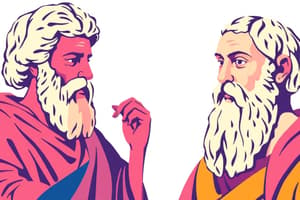Podcast
Questions and Answers
What is the primary purpose of the state according to Aristotle?
What is the primary purpose of the state according to Aristotle?
- To ensure survival and security
- To enable citizens to live a good and virtuous life (correct)
- To establish a strong military presence
- To maintain law and order
According to Aristotle, how does the state arise?
According to Aristotle, how does the state arise?
- From the collaboration of families forming villages and villages forming the state (correct)
- From a single individual's authority
- From military conquest and expansion
- From philosophical ideas dominating society
What does Aristotle mean by stating that humans are naturally political animals?
What does Aristotle mean by stating that humans are naturally political animals?
- They avoid participating in governance
- They prefer isolation over community living
- They only engage in politics for power and control
- They are driven to form communities and states for better living (correct)
What virtue is essential for political leaders according to Aristotle?
What virtue is essential for political leaders according to Aristotle?
What does Aristotle say about the best political form?
What does Aristotle say about the best political form?
What is the highest good the state aims to achieve, according to Aristotle?
What is the highest good the state aims to achieve, according to Aristotle?
How does Aristotle categorize governments?
How does Aristotle categorize governments?
What are the smaller communities that evolve into a state, as stated by Aristotle?
What are the smaller communities that evolve into a state, as stated by Aristotle?
What type of government does Aristotle consider ideal?
What type of government does Aristotle consider ideal?
What is the foundation of Plato's political philosophy?
What is the foundation of Plato's political philosophy?
In Aristotle's typology of governments, which form represents rule by many for their own selfish interests?
In Aristotle's typology of governments, which form represents rule by many for their own selfish interests?
What factor does Aristotle deem essential for the stability of a state?
What factor does Aristotle deem essential for the stability of a state?
In Plato’s ideal government, who are the rulers?
In Plato’s ideal government, who are the rulers?
How does Aristotle define justice?
How does Aristotle define justice?
How does Aristotle define a citizen?
How does Aristotle define a citizen?
According to Aristotle, which of the following is a perversion of proper governance?
According to Aristotle, which of the following is a perversion of proper governance?
What classification of governments does Aristotle reject?
What classification of governments does Aristotle reject?
What principle regarding private property does Aristotle advocate for?
What principle regarding private property does Aristotle advocate for?
Which class does Plato believe is primarily responsible for the protection of the state?
Which class does Plato believe is primarily responsible for the protection of the state?
What type of justice involves the fair distribution of goods and honors?
What type of justice involves the fair distribution of goods and honors?
Aristotle believed education was crucial for what aspect of citizenship?
Aristotle believed education was crucial for what aspect of citizenship?
What is Aristotle's stance on women in politics?
What is Aristotle's stance on women in politics?
What role does Aristotle assign to the middle class in his preferred government?
What role does Aristotle assign to the middle class in his preferred government?
Plato's view of justice is best defined as:
Plato's view of justice is best defined as:
What does Aristotle suggest is essential for the strength of a state?
What does Aristotle suggest is essential for the strength of a state?
How does Aristotle view the concept of the common good?
How does Aristotle view the concept of the common good?
What is Aristotle's empirical approach to political philosophy primarily focused on?
What is Aristotle's empirical approach to political philosophy primarily focused on?
What did Plato believe should be regulated by the state for achieving common good?
What did Plato believe should be regulated by the state for achieving common good?
What does Aristotle believe about leadership in a state?
What does Aristotle believe about leadership in a state?
Which government type does Aristotle associate with ruling for the common good but often criticized for its potential for mob rule?
Which government type does Aristotle associate with ruling for the common good but often criticized for its potential for mob rule?
How does Aristotle view human beings in relation to the state?
How does Aristotle view human beings in relation to the state?
In Aristotle's view, what is the role of the middle class within a state?
In Aristotle's view, what is the role of the middle class within a state?
What does Plato consider the ideal state to reflect?
What does Plato consider the ideal state to reflect?
What can be inferred about the role of women in Plato's political views?
What can be inferred about the role of women in Plato's political views?
According to Aristotle, what consequences arise from governments that fail to serve the common good?
According to Aristotle, what consequences arise from governments that fail to serve the common good?
Which aspect of Aristotle's philosophy diverges most from Plato's?
Which aspect of Aristotle's philosophy diverges most from Plato's?
What plays a key role in the development of experience according to Aristotle?
What plays a key role in the development of experience according to Aristotle?
How does Aristotle define particulars?
How does Aristotle define particulars?
According to Aristotle, how are universals discovered?
According to Aristotle, how are universals discovered?
What distinguishes the essence of an object from its accidental properties?
What distinguishes the essence of an object from its accidental properties?
What is the role of the passive intellect in Aristotle's epistemology?
What is the role of the passive intellect in Aristotle's epistemology?
Which aspect of the mind does Aristotle identify as responsible for generating universals?
Which aspect of the mind does Aristotle identify as responsible for generating universals?
What characterizes higher knowledge in Aristotle's epistemology?
What characterizes higher knowledge in Aristotle's epistemology?
What aspect differentiates the universals in Aristotle's view from those in Plato's philosophy?
What aspect differentiates the universals in Aristotle's view from those in Plato's philosophy?
What is the process by which Aristotle's intellect separates essential qualities from accidental features?
What is the process by which Aristotle's intellect separates essential qualities from accidental features?
What type of knowledge does Aristotle classify as the lowest form?
What type of knowledge does Aristotle classify as the lowest form?
In biology, what gradual approach might represent Aristotle's concept of acquiring knowledge?
In biology, what gradual approach might represent Aristotle's concept of acquiring knowledge?
What does Aristotle argue is essential for true knowledge aside from understanding 'what'?
What does Aristotle argue is essential for true knowledge aside from understanding 'what'?
Which statement best describes Aristotle's view on the relationship between sensory experience and knowledge?
Which statement best describes Aristotle's view on the relationship between sensory experience and knowledge?
What term does Aristotle use to describe systematic knowledge based on understanding causes?
What term does Aristotle use to describe systematic knowledge based on understanding causes?
What is the first step in Aristotle's process of acquiring knowledge?
What is the first step in Aristotle's process of acquiring knowledge?
How does Aristotle define universals in his theory of knowledge?
How does Aristotle define universals in his theory of knowledge?
What method does Aristotle employ to move from particular observations to general principles?
What method does Aristotle employ to move from particular observations to general principles?
What role do first principles play in Aristotle's knowledge system?
What role do first principles play in Aristotle's knowledge system?
In Aristotle's view, how are universals and particulars related?
In Aristotle's view, how are universals and particulars related?
What is the final goal of Aristotle's process of acquiring knowledge?
What is the final goal of Aristotle's process of acquiring knowledge?
What does Aristotle consider necessary for demonstrating truths?
What does Aristotle consider necessary for demonstrating truths?
Which term best describes the mental process of extracting universals from particulars?
Which term best describes the mental process of extracting universals from particulars?
How does Aristotle's theory of universals differ from Plato's?
How does Aristotle's theory of universals differ from Plato's?
What best describes Aristotle's epistemological stance?
What best describes Aristotle's epistemological stance?
Which aspect of Aristotelian inquiry depends on the establishment of universals?
Which aspect of Aristotelian inquiry depends on the establishment of universals?
What does Aristotle consider the highest form of knowledge?
What does Aristotle consider the highest form of knowledge?
What is the primary focus of Aristotle's method of demonstration?
What is the primary focus of Aristotle's method of demonstration?
What is Aristotle's view on the concept of private property?
What is Aristotle's view on the concept of private property?
Which of the following best describes Plato's view on women?
Which of the following best describes Plato's view on women?
What distinguishes Aristotle's epistemology from that of Plato?
What distinguishes Aristotle's epistemology from that of Plato?
According to Aristotle, what is important for individual and societal well-being?
According to Aristotle, what is important for individual and societal well-being?
What form of governance does Aristotle believe is appropriate in certain circumstances?
What form of governance does Aristotle believe is appropriate in certain circumstances?
What aspect of political participation does Aristotle believe is essential for citizenship?
What aspect of political participation does Aristotle believe is essential for citizenship?
What is a key difference in the views of Aristotle and Plato regarding property?
What is a key difference in the views of Aristotle and Plato regarding property?
In Plato’s ideal state, what is the role of the individual?
In Plato’s ideal state, what is the role of the individual?
What was Aristotle's approach to the role of women in society?
What was Aristotle's approach to the role of women in society?
What did Aristotle claim about the institution of slavery?
What did Aristotle claim about the institution of slavery?
How does Aristotle’s view of the state differ from Plato’s in terms of individual rights?
How does Aristotle’s view of the state differ from Plato’s in terms of individual rights?
What is the foundational principle of Aristotle's empirical epistemology?
What is the foundational principle of Aristotle's empirical epistemology?
What did Plato advocate for regarding the guardians of his ideal state?
What did Plato advocate for regarding the guardians of his ideal state?
What is the ultimate goal of the state according to Aristotle?
What is the ultimate goal of the state according to Aristotle?
Flashcards are hidden until you start studying
Study Notes
Aristotle's Political Philosophy
- Comprehensive examination of the state, citizen roles, and political organization in Politics.
- Views the state (polis) as a natural entity formed from humans’ need for association and self-sufficiency, aiming for "good life" (eudaimonia).
a. State: Construction and Nature, Form, Origin, Goal, Requisite of Political Leadership, Typology of Government
- Construction and Nature: State arises from smaller communities (families, villages) for human flourishing.
- Origin of the State: Originates from necessity for cooperation; families form villages, leading to self-sufficient state.
- Goal of the State: Aims to enable citizens to achieve moral and intellectual excellence, focusing on overall happiness.
- Form of the State: Rejects a singular ideal government; acknowledges the need for context-specific political systems.
- Requisite of Political Leadership: Leaders must possess virtue and wisdom, governing for the community's benefit.
- Typology of Government: Classifies governance by rulers and their motives:
- Monarchy: Ideal rule by one for common good.
- Aristocracy: Rule by few for common good.
- Polity: Mixed government of many for common good.
- Corrupted forms: Tyranny, oligarchy, and democracy for self-interest.
b. Citizen: Who and What is a Citizen
- Who is a Citizen: Participates in governance; excludes women, slaves, and non-natives from political life.
- What is a Citizen: Defined by involvement in political decisions and adherence to laws and state constitution.
c. Factors Associated with National Strength
- Population: Requires balanced population size to maintain order.
- Middle Class: Crucial for stability, preventing extremes of wealth and poverty.
- Education and Virtue: Well-educated citizens more capable of sound judgment.
- Laws and Constitution: Essential for justice and the welfare of the state.
- Leadership: Wisdom and virtue in leadership critical for state well-being.
d. View of Private Property
- Defends private property as natural and virtuous, encouraging responsibility and community benefits.
- Private Property and Virtue: Ownership fosters care and generosity.
- Common Use of Resources: Advocates for using wealth to benefit society.
e. Understanding of the Common Good
- Central to political philosophy; the state exists for collective well-being.
- Collective Happiness: Greater than individual interests; involves justice and fairness.
- Governance: Legitimate governments must prioritize the common good, avoiding corruption.
f. View of Women in Relation to Politics
- Controversial perspective: women are seen as inferior to men and unfit for active political roles.
- Inferiority of Women: Lacks rational capacity for governance; confined to domestic roles.
- Impacts on Politics: Exclusion from citizenship and governance.
Comparison of Plato and Aristotle's Thoughts on the State and Government
- Both philosophers focus on the state’s role in achieving the highest good but differ significantly in methodology and assumptions.
1. Philosophical Foundations of the State
- Plato’s Idealism: State as reflection of perfect Forms; purpose rooted in abstract ideals.
- Aristotle’s Naturalism: Emphasizes empirical observation and human association as the foundation for political organization.
2. Role of Justice in the State
- Plato’s Justice: Harmony among classes, where each fulfills their designated role.
- Aristotle’s Justice: Focused on fairness and merit-based distribution of goods.
3. View on the Ideal Government
- Plato’s Utopian Government: Philosopher-kings govern in a hierarchical society focused on the common good.
- Aristotle’s Mixed Government: Advocates for a polity that balances interests of diverse social classes.
4. View on Private Property
- Plato’s Communal Property: Emphasizes communal ownership to eliminate divisions.
- Aristotle’s Support of Private Property: Views it as natural and beneficial for promoting responsibility and generosity.
5. View on the Role of the Individual and the Citizen
- Plato’s Collective Focus: State authority supersedes individual autonomy; actively involved citizens are mainly rulers and guardians.
- Aristotle’s Balance: Highlights individual flourishing as essential to the state’s well-being; active political participation is necessary for citizenship.
6. Views on Women and Slavery
- Plato’s Progressive View: Advocates for equal roles for women in governance based on abilities.
- Aristotle’s Traditional View: Considers women inferior, confining them to domestic roles; lack of participation in politics.
Aristotle's Theory of Knowledge: "Finding Universals from the Particulars"
- Emphasizes empiricism: all knowledge is rooted in sensory experience.
- Argues universals arise from observing particulars, opposing Plato's ideal forms.### Aristotle's Theory of Knowledge
- Knowledge acquisition starts with sense perception; the mind gathers information through senses and experiences.
- Perception and Sensation: Foundation of knowledge; begins with observing specific objects and events.
- Memory and Experience: Repeated sensory perceptions build experience, allowing for pattern recognition.
- Example: Observing multiple trees enables understanding what defines a tree.
Induction: From Particulars to Universals
- Aristotle's inductive reasoning derives general principles (universals) from specific observations (particulars).
- Particulars: Concrete instances in the world, e.g., individual trees or dogs.
- Universals: General concepts, such as "tree-ness," discovered through analyzing particulars.
- Identification of common features through repeated observations leads to the formation of universal concepts.
- Example: Observing different dogs highlights shared traits, culminating in the concept of "dog-ness."
Abstraction: Moving from Sensible to Intelligible
- Abstraction separates essential qualities of objects from their accidental features.
- Essence vs. Accident: Essence defines what an object is; accidental properties are non-essential traits.
- Understanding the intelligible form of a thing enables general comprehension beyond particulars.
The Role of Active and Passive Intellect
- Passive Intellect: Receives and stores sensory data, processing raw experiences.
- Active Intellect: Responsible for abstracting universals from particulars, organizing data into knowledge.
- Interaction between both intellects facilitates the transition from perception to higher understanding.
Knowledge as a Process: Moving from Lower to Higher Knowledge
- Knowledge acquisition is gradual, commencing with sensory perception and advancing to universal principles.
- Lower Knowledge: Based on sensory data and experiences providing particular facts.
- Higher Knowledge: Achieved through induction and abstraction, resulting in systematic understanding (episteme).
- Example: Classifying observed animals under universal categories based on shared features leads to understanding biological principles.
Aristotle vs. Plato: Universals and Particulars
- Plato: Universals exist independently as perfect Forms; knowledge comes through reason, detached from sensory experience.
- Aristotle: Universals are immanent in particulars; they are uncovered through sensory experience and introspection.
- Aristotle insists true knowledge derives from exploring the empirical world, opposing the notion of separate, abstract Forms.
Demonstration and Deduction: Achieving Knowledge of Universals
- Demonstration: Involves proving truths based on first principles derived from induction.
- Deduction: Moves from established general principles to specific conclusions, key for scientific inquiry.
Conclusion
- Aristotle’s theory emphasizes empiricism; knowledge starts with sensory encounters with the world.
- Through induction, the intellect abstracts universals from particulars, forming the basis for scientific understanding.
- Unlike Plato, Aristotle posits that universals arise within particulars, emphasizing observation and experience in knowledge formation.
Studying That Suits You
Use AI to generate personalized quizzes and flashcards to suit your learning preferences.





